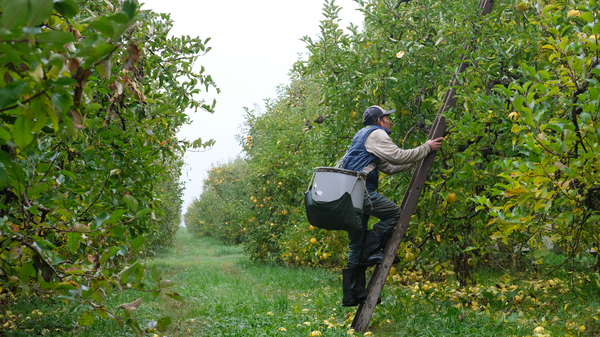Fall in West Virginia’s Eastern Panhandle means apple season. Visitors from near and far visit Reddington’s Farm & Orchard in Harpers Ferry to pick their own apples — a way to get fresh produce, and also a fun family activity.
This year, owner Tina Reddington said her main concern has been the weather. The region experienced a severe drought in July and August, followed by a sudden tropical storm.
“We’re in a funky spot where, when the storms come through, they kind of go around our farm,” she said. Still, “We’ve been affected by the drought, so we have less apples than we usually do.”
Across the state, local orchards might have a normal season ahead. Or, like Reddington’s, they might even be slightly behind on apple output.
But the situation is vastly different on larger, commercial farms, which grow apples specially to be processed into packaged products like applesauce and apple concentrate.
Many of these orchards are found in West Virginia. And, despite the weather woes, many of these orchards currently cannot find buyers for all of their apples.
Nowhere to sell
“Imports in the apple ingredient community have greatly diminished the opportunity for the American farmer to sell a perfectly good apple into the apple processing world,” said Mike Meyer, head of farmer advocacy at FarmLink. His nonprofit helps connect farmers experiencing oversupply with food banks and hunger relief programs.
“This has most directly impacted the farmers in West Virginia, but they’re not alone,” he said.
According to Meyer, the country’s increased dependence on imported goods reduces sales for American farmers. Plus, apple exports fell during the pandemic, and haven’t fully recovered.
Photo Credit: Chris Schulz/West Virginia Public Broadcasting
Problems like these in the apple industry aren’t new. Last year, tens of millions of pounds in West Virginia-grown apples didn’t have an immediate buyer. Many farmers were unsure how to proceed.
“It is fair to say that the apple processing market and those communities have all but disappeared,” Meyer said. “What is remaining is of so little economic benefit to the farmer that the farmer has to decide if it’s better to not even harvest their apple at all and just let it go to waste.”
A federal intervention
Then the federal government stepped in. In 2023, the state received $10 million in United States Department of Agriculture (USDA) funding through the Agricultural Adjustment Act, a 1935 law allowing the government to subsidize agricultural oversupply.
Officials with the West Virginia Department of Agriculture used this funding to subsidize millions of pounds of apples. Then, through nonprofits like FarmLink, the 16 million pounds of produce were donated to food banks and hunger relief programs nationwide.
This year, West Virginia will repeat that process. In late August, Sen. Joe Manchin announced that the USDA would provide West Virginia $3.1 million this year to help growers sell off their surplus.
One West Virginia business that participated in the program in 2023 is Appalachian Orchard Company, a family farm in Berkeley County. The company was one of many that experienced apple oversupply last year.
“A lot of them went bad in storage and they lost money on them,” said sales team member Christopher Daniel. “They haven’t been able to recuperate from everything.”
Daniel said federal support saved last season’s harvest. While the conditions causing the oversupply this year persist, he said Appalachian Orchard Company feels better knowing the fund redistribution program can offer additional support.
“I think this is going to help a lot of growers who didn’t have an outlet at all because they grow primarily processing apples,” Daniel said. “It’s going to give them somewhere to ship their apples where they would’ve just had to let them fall on the ground.”
Photo Credit: Briana Heaney/West Virginia Public Broadcasting
The bigger picture
Still, some state and federal officials worry that recurring supply problems could mark a long-term issue for the industry.
Manchin, who Meyer said played a key role in securing the 2023 and 2024 USDA funding, recently pushed for a USDA study on the apple surplus in West Virginia.
The bill was passed by the Senate Appropriations Committee, and aims to better understand the issues affecting the state’s apple market, namely difficulties preserving and selling surplus produce.
“This study will examine the limited refrigerated storage capacity within processing facilities, particularly in West Virginia and the broader region where these facilities are located,” a representative from Manchin’s office wrote in an email to West Virginia Public Broadcasting.
The study will also explore “whether there has been a significant increase in foreign apple imports, including apple concentrate, which may be displacing local apples in the market,” the email read.
Meyer agreed that struggles in the apple industry extend beyond a single year’s harvest. But, at the same time, he thinks part of the problem for farmers is simply not knowing where to send produce.
According to the USDA, about 14 percent of U.S. households faced food insecurity in 2023.
Meanwhile, the USDA has also found up to 40 percent of the nation’s food supply goes to waste. That is more than 133 billion pounds of food.
Meyer says supporting American farmers and reducing food waste could go hand in hand. It’s just a matter of connecting extra produce with people and communities in need.
And this year, FarmLink will help reroute trade networks once again, packing millions of pounds of apples into trucks for redistribution.
“Fresh produce is a much lower-cost alternative to prepared foods to combat food insecurity.” Meyer said. “But fresh produce requires a completely different handling system. So it’s not the end-all solution, but it can get us a long way there.”
